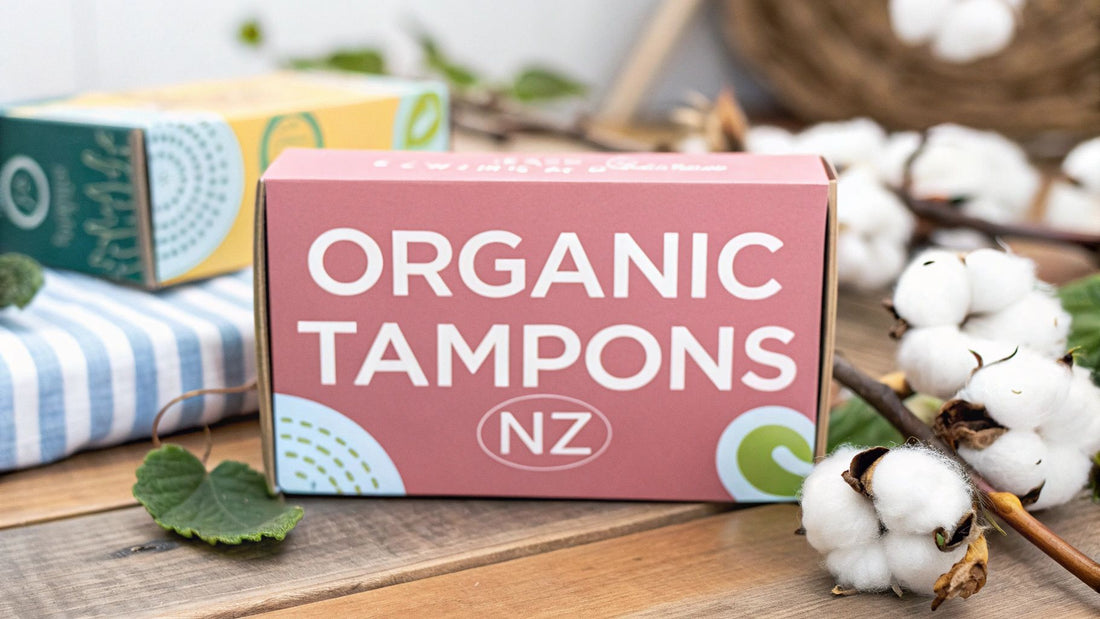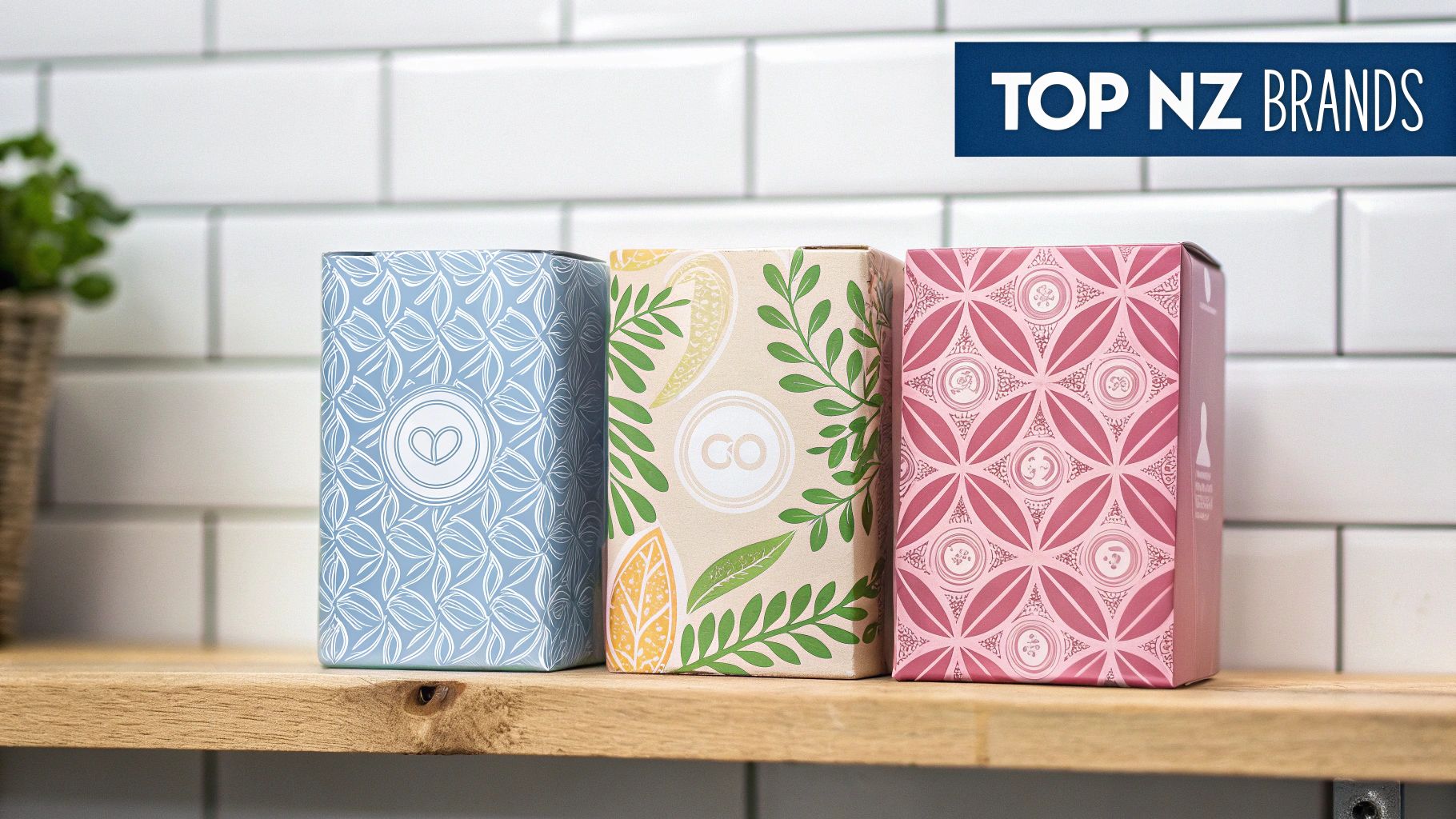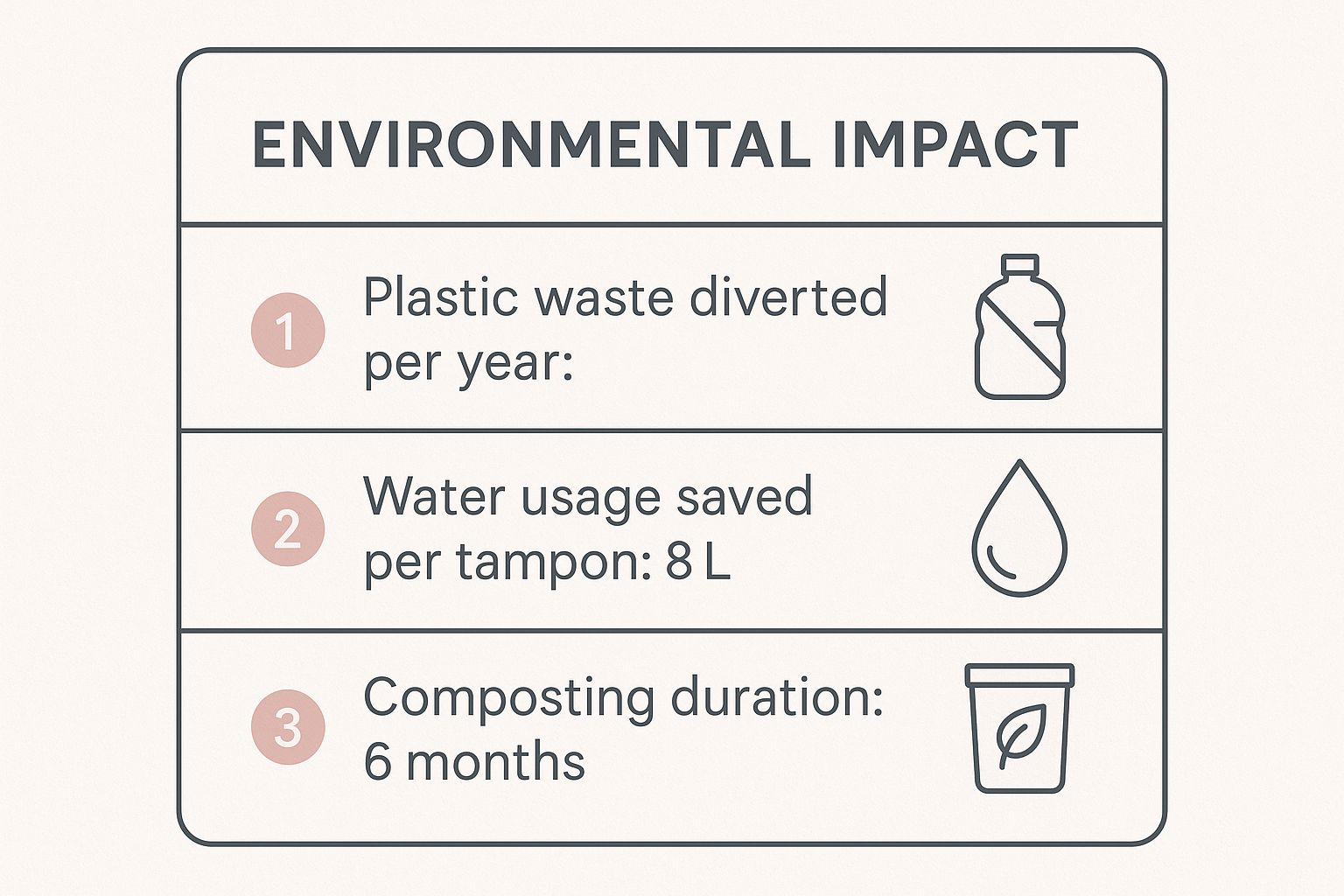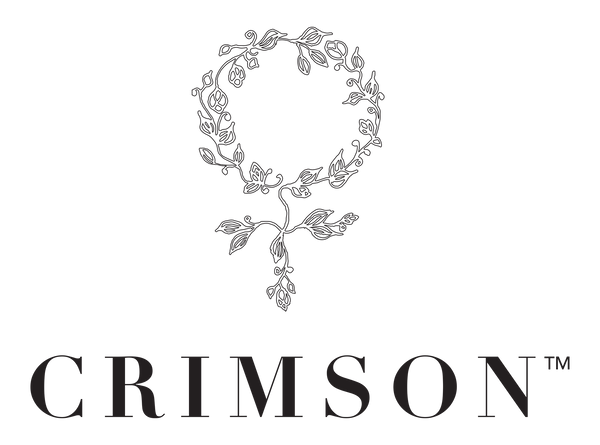
Your Guide to Organic Tampons in New Zealand
Share
If you're looking for ways to make your period a little gentler on your body and on our beautiful Aotearoa, you’ve come to exactly the right place. Choosing organic tampons in New Zealand is such a simple but powerful step towards a more conscious and comfortable cycle.
Your Guide to Healthier, Kinder Periods in NZ
What does it really mean to have a kinder period? It’s so easy to feel a bit overwhelmed with all the choices and information out there, but making a decision you feel good about doesn't have to be complicated. This guide is here to be your personal roadmap, helping you feel empowered, not confused.
Together, we’ll look at what sets organic tampons apart from the conventional options and understand why so many incredible people across New Zealand are making the switch. It's a journey that connects your personal wellbeing with a deeper care for our environment, leaving you feeling genuinely wonderful about the products you use every month.
Why This Conversation Matters
The move towards organic period care is so much more than a trend; it's a beautiful shift driven by a desire for better health and sustainability. Many of us are starting to ask really important questions about what's actually in the products we use, especially for something so intimate.
This growing awareness is making waves. The rise in organic tampon use in New Zealand is directly tied to a greater focus on health, particularly among women aged 18 to 40. In fact, regional surveys show that around 35-40% of women in cities like Auckland and Wellington now opt for natural menstrual products, actively avoiding things like chlorine-bleached fibres and synthetic fragrances. You can dive deeper into these consumer trends on markwideresearch.com.
Choosing organic is more than just a purchase; it's a statement of love for your body and our planet. It’s about prioritising pure ingredients and sustainable practices, one period at a time.
This guide will help you understand:
- What truly makes a tampon 'organic' and why it's so important.
- The benefits for both your body and the beautiful environment of Aotearoa.
- How to confidently choose the right product for your unique flow and personal values.
Let's start this journey to a healthier, kinder period together, my friend.
What Makes an Organic Tampon Different

Let's get right to the heart of it. Think about the difference between a standard supermarket apple and one that’s certified organic. The real distinction isn't just the sticker; it’s about how it was grown and what was lovingly left out. Organic tampons are exactly the same – it all starts with the soil.
The journey begins in a field where cotton is grown without any synthetic pesticides, herbicides, or genetically modified organisms (GMOs). This is such a big deal. It’s not only better for our planet, but it also means those chemical residues don't end up in the cotton that becomes your tampon. It’s a commitment to purity, right from the very start.
This dedication to clean materials carries through the entire manufacturing process, resulting in a product that’s fundamentally different from the conventional options on the shelf.
Pure Materials from Farm to You
The biggest difference is what they're made of. A genuine organic tampon contains just one thing: 100% certified organic cotton. That’s it. You won't find synthetic fibres like rayon or viscose, sneaky plastic additives, or artificial fragrances that can often lead to irritation.
On the other hand, conventional tampons are usually a mix of cotton and rayon, a synthetic fibre made from wood pulp. While it's considered safe, rayon is incredibly absorbent, and its production often involves chemicals that many of us would rather avoid putting in such a sensitive area of our bodies.
The true beauty of an organic tampon lies in its simplicity. It’s a single-ingredient product, crafted from pure cotton, and designed to be gentle and effective.
A Gentler Whitening Process
Another major point of difference is how the cotton gets its clean, white appearance. Many mainstream tampons are bleached with chlorine, a process that can create tiny amounts of toxic byproducts called dioxins. Even though the levels are low, it's something a lot of us would prefer to avoid altogether.
Organic tampons are purified using a completely chlorine-free bleaching process. This is typically done with hydrogen peroxide, a safe and natural compound that simply breaks down into oxygen and water. It’s a much gentler method that gets the job done without any unwanted chemical extras.
If you want to dive a bit deeper into the science, you can explore why organic cotton tampons are a better choice over on our website.
Ultimately, choosing an organic tampon is about opting for a product that’s cleaner, simpler, and closer to nature. It’s about being mindful of what you’re putting into your body and feeling really good about it.
Understanding the GOTS Certified Difference
When you're choosing something so personal, having complete trust in it is everything. But with so many products claiming to be ‘natural’ or ‘eco-friendly’, how can you be sure you’re getting the real deal? This is where the GOTS (Global Organic Textile Standard) certification comes in, and honestly, it’s a game-changer.
Think of the GOTS logo as a heartfelt promise. It’s not just some fancy label; it’s the highest possible standard for organic textiles anywhere in the world. For a tampon to earn this certification, it has to meet incredibly strict rules at every single step of its journey—from the moment the cotton seed is planted right through to the final product arriving in your hands.
This means when you see the GOTS logo on a box of organic tampons in New Zealand, you can feel a deep sense of reassurance. You know that what you're buying is genuinely what it claims to be.
More Than Just Organic Cotton
The GOTS standard goes so much deeper than simply ensuring the cotton is grown without pesticides. It’s a holistic promise that covers the entire lifecycle of the product, making sure it's kind to both people and the planet.
For any product to become GOTS certified, it must meet some seriously tough criteria across several key areas.
-
Purity of Material: A minimum of 95% of the fibre has to be certified organic. This guarantees that the core ingredient is clean and grown sustainably, completely free from GMOs and toxic pesticides.
-
Environmental Responsibility: The entire manufacturing process is put under the microscope. This covers everything from responsible water usage and proper wastewater treatment to using only approved, low-impact dyes and processing agents.
-
Social and Ethical Standards: This is a huge one. GOTS ensures that every single person involved in making the product is treated fairly. We're talking safe working conditions, fair wages, and a total ban on child labour.
Essentially, GOTS provides a complete picture of accountability. It’s your guarantee that the choice you’re making supports a system that is ethical, sustainable, and truly clean from start to finish.
"GOTS isn't just a certification for a product; it’s a certification for an entire process. It ensures environmental and social responsibility are woven into the very fabric of what you buy."
Choosing a GOTS-certified product is about more than just your own wellbeing. It’s a powerful way to support farming practices that protect our soil, manufacturing that respects our waterways, and companies that genuinely value their workers. It’s certified peace of mind in every single box.
Why So Many Kiwis Are Choosing Organic Tampons
It seems like everywhere you look, people are talking about making more conscious choices. It’s in the food we buy, the clothes we wear, and now, it’s extending to how we manage our periods. Here in New Zealand, there's a real groundswell of support for organic tampons, and it's just wonderful to see.
The reasons for this shift are both personal and interconnected. It often starts with a simple desire to do better for our own bodies, but it quickly grows into a wider commitment to caring for our precious whenua (land). It’s a quiet realisation that a small monthly choice can actually create a powerful, positive ripple effect.
This isn't just a trend; it's a genuine movement. The organic tampon market here in New Zealand has grown significantly over the last decade. It’s all part of our collective move towards healthier, more sustainable living, with many of us more than willing to invest in biodegradable options that help cut down on plastic waste.
A Kinder Choice for Your Body
One of the main drivers behind making the switch is personal health. Simple as that.
When you choose an organic tampon, you’re choosing a product made from 100% pure organic cotton. Nothing else. That means you’re saying a clear ‘no, thanks’ to the synthetic materials, artificial fragrances, and potential chemical residues from pesticides that often turn up in conventional products.
For many people, this simple change leads to a more comfortable period with less irritation. Organic cotton is naturally soft and breathable, so it’s incredibly gentle on one of the most sensitive areas of your body. It’s about peace of mind, knowing exactly what you're putting inside you. If you want to dig deeper into what might be lurking in standard tampons, we've explored whether your current tampon could be carcinogenic.
To make it even clearer, let's break down the key differences.
Conventional vs Organic Tampons: A Quick Comparison
This table puts the main points side-by-side, so you can see exactly what you're choosing.
| Feature | Conventional Tampons | GOTS Certified Organic Tampons |
|---|---|---|
| Material | Cotton/rayon blend, often not organic | 100% GOTS certified organic cotton |
| Bleaching | Often uses chlorine bleaching processes | Totally Chlorine Free (TCF) |
| Additives | May contain fragrances, dyes, and synthetic materials | Free from all synthetics, fragrances, and dyes |
| Pesticide Residue | Potential for pesticide and herbicide residue | No harmful chemical residues from farming |
| Biodegradability | Contains plastic and synthetic fibres; not biodegradable | 100% biodegradable (tampon and wrapper) |
| Health Impact | Potential for irritation and exposure to unknown chemicals | Hypoallergenic, breathable, and reduces risk of irritation |
| Environmental | Contributes to plastic pollution and chemical runoff | Supports organic farming and reduces landfill waste |
The comparison really speaks for itself. It’s a straightforward choice between a product with potential unknowns and one that prioritises purity, both for your body and the environment.
A Lighter Footprint on Aotearoa
Looking beyond our own bodies, the decision to go organic has a huge environmental impact. Standard period products are a major source of plastic pollution, from their synthetic fibres and plastic applicators to their individual wrappers. Organic tampons, on the other hand, are fully biodegradable.
Making the switch is a simple act of kaitiakitanga (guardianship)—a small way to honour and protect the land that nurtures us all.
This image really drives home just how powerful that small change can be.

The numbers are clear: choosing organic drastically cuts down on plastic waste and water consumption while supporting a natural cycle that gives back to the earth. It’s about aligning your daily choices with your values, creating a period that feels good for you and good for Aotearoa.
Finding Your Perfect Match
Alright, let's find your perfect match. Choosing the right organic tampon is a really personal thing—it’s all about listening to your body and figuring out what works just for you. Think of it like finding a favourite pair of jeans; they need to fit well, feel comfortable, and give you the confidence to get on with your day.
We'll walk through the key things to consider, from absorbency to applicators, so you can feel totally clued-in on choosing the best option for your unique flow. This is your body and your period, and finding the right fit is a simple but powerful act of self-care.
Understanding Absorbency Levels
First up, let's talk flow. Periods are rarely consistent from start to finish, so having a mix of absorbencies on hand can be a game-changer. The great news is that absorbency levels for organic tampons are standardised, just like the conventional ones you might be used to, making the switch super straightforward.
Here's a simple guide to matching absorbency with your flow:
- Light: Ideal for those first or last days when your flow is much lighter.
- Regular: This is the go-to for most of us on our average flow days. It’s your reliable all-rounder.
- Super: Made for your heaviest days, giving you extra protection and peace of mind when you need it most.
A good rule of thumb is to always use the lowest absorbency that handles your flow. It’s not just more comfortable, it’s also the recommended practice for your health.
Applicator or Non-Applicator: Your Choice
Next is the big question: applicator or non-applicator? Honestly, there’s no right or wrong answer here, lovely. It’s purely down to what you find most comfortable and easiest to use. Both are great options, so it all boils down to your personal preference.
Non-applicator tampons are super discreet and create less waste, which is a definite plus for our planet. They’re compact and easy to slip into a small pocket or purse.
On the other hand, applicator tampons can make insertion a bit simpler, particularly if you’re new to using them. Lots of people find they help with getting the position just right.
The most important thing is that you feel comfortable and in control. Don’t be afraid to try both styles to see what feels best for your body. It’s all about finding what works for you.
Where to Find Organic Tampons in New Zealand
Finding high-quality organic tampons in New Zealand is easier than ever. You can now pick them up from quite a few places, making it simple to work them into your regular shopping trips.
You can usually find them at:
- Local Health Stores: These shops are often brilliant champions of organic and natural products.
- Supermarkets: Many larger supermarkets now have dedicated aisles or sections for organic period care.
- Online Subscriptions: This is an incredibly convenient way to get your preferred tampons delivered straight to your door, meaning no more last-minute dashes to the shops.
With a subscription service, you just set your schedule and forget about it. It’s an easy way to make sure you’re always stocked up, making your period that little bit less of a hassle.
Got Questions About Organic Tampons? We've Got Answers
Switching up your period products can bring up a lot of questions, and that's completely normal. This is your go-to spot for some of the most common queries we get about organic tampons here in New Zealand. Think of it as a friendly chat to clear things up and help you feel confident about the wonderful choices you're making for your body.
We've pulled together the top questions and laid out the answers, plain and simple. Our mission is to make sure you feel totally informed and supported on your journey to a better period.
Are Organic Tampons Actually Safer?
For many people, the answer is a definite yes. The real magic of an organic tampon lies in what it doesn't have. It’s made from just one thing: 100% certified organic cotton. That means the cotton was grown without any synthetic pesticides or herbicides, so you’re not introducing those chemical residues into your body.
On top of that, organic tampons are purified without chlorine bleach. This is a big deal because the chlorine-free process prevents the creation of dioxins, which are unwanted chemical byproducts. While health authorities generally say the risk from conventional tampons is low, choosing organic offers real peace of mind. It’s about opting for a pure, simple product that you can fully trust.
Do They Work as Well as Regular Tampons?
Absolutely! You don't have to choose between purity and performance. Organic tampons are designed to be just as effective and reliable as the conventional ones you might be used to.
Absorbency levels—like light, regular, and super—are standardised across the industry. So, an organic 'regular' will give you the exact same protection you’d expect from a conventional 'regular'. The only difference is the material inside, not how well it works. You can go about your day with the same confidence, knowing you’re protected by cleaner ingredients.
Your period protection shouldn't be a compromise. With organic tampons, you get the high performance you need with the pure ingredients you deserve.
Why Do Organic Tampons Cost a Bit More?
This is a really fair question. The slightly higher price tag really comes down to what it takes to produce something ethically and sustainably from start to finish.
Growing organic cotton, for instance, is far more hands-on. Farmers rely on natural methods instead of chemical shortcuts, which often means smaller crop yields. Then there's the GOTS certification process, which involves strict audits at every single stage to ensure high environmental and social standards are met. All of this adds to the cost.
So, while you might pay a little more, you’re actually investing in a whole system that champions:
- Sustainable agriculture: Protecting our soil and waterways from nasty chemicals.
- Ethical production: Ensuring fair wages and safe working conditions for workers.
- A healthier planet: Lowering the environmental footprint of your period care.
It's about looking past the price and supporting a kinder, more conscious way of doing things.
Can I Compost My Organic Tampons at Home?
What a brilliant question for eco-conscious Kiwis! Since 100% organic cotton tampons are just natural plant fibres, the tampon itself is completely biodegradable and compostable. That’s fantastic news if you’re trying to cut down on your household waste.
The key thing to check, though, is the packaging and applicator. Some brands might still use plastic applicators or wrappers that aren't compostable. If you're using a non-applicator tampon with a paper or certified biodegradable wrapper, you can absolutely pop the used tampon into a well-managed home compost bin.
It’s always a good idea to double-check with your local council's guidelines before adding them to your green bin, just to be sure. For more detailed answers, you can always head over to our complete Crimson Organic FAQs page. We’re always here to help.
